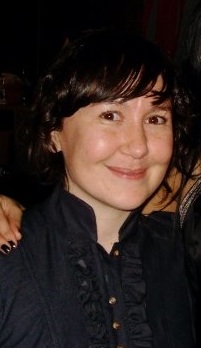Phoebe Judge and Lauren Spohrer launched “Criminal” in 2014, with producer Eric Mennel. Judge and Spohrer had worked together on “The Story” with Dick Gordon, a public radio program that went off the air in 2013. Afterwards, Judge told Spohrer she wanted to host her own radio show. Spohrer joked that public radio listeners don’t like to admit it, but they love watching Law and Order, so maybe the two of them should start a crime show.
At the time, Judge says, there weren’t any big shows focused on crime. “Serial” didn’t exist yet. “There’s so much crime on the news all the time, and there’s so many different representations of crime,” Spohrer says. It seemed like a niche worth filling.
Most “Criminal” stories aren’t about blood and gore. The show often explores bizarre subcultures and moral gray zones. The most recent episode, “Hastings,” describes what happens after a student brings a gun to school. No shots are fired, but that didn’t prevent students from feeling deeply traumatized. In other words, “Criminal” is interested not only in crimes that are committed, but also in the crimes we imagine and fear. “Criminal” describes itself as “stories of people who’ve done wrong, been wronged, or gotten caught somewhere in the middle.”
In Episode 14, “The Fifth Suspect,” “Criminal” told the story of Tommy Wall, a man mistakenly accused of producing child pornography. Local police officers and journalists both played a role in tarnishing his reputation, when they distributed his name and picture on television. Wall first learned he was a suspect via text message; in the months that followed, he struggled to overcome the stigma that resulted from his arrest. Judge had done some reporting on the story for WUNC, and reached out to Wall, “never thinking he would say yes. He had just been released.” He did say yes, and Judge, Mennel, and Spohrer went to work putting it together.
Some of your tactics remind me of the mystery genre. Questions are a thing that detectives ask, too. And the way the ‘reveal’ works—some crucial piece of information doesn’t come out until the middle of the story. That sounds like the way you get a reader invested in a Sherlock Holmes novel. Do you think about genres around crime journalism as influences for the way that you work?

Lauren Spohrer
Spohrer: I’m a big fan of noir, crime fiction, and when we were first starting the show that was much more present on my mind. We think a lot about the order in which we reveal information. I think of it in terms of always wanting the listener to have something to do. If you tell me everything right away, if there’s not a question for me to be considering, if there’s nothing to be curious about—I’m probably going to go find something else to listen to or read. Also, I think it gives you a chance to get to know the person in question.
Judge: That’s why our edits, I think, are so long and contentious.
How long, and how contentious?
Spohrer: The latest episode, I think four or five edits. For hours.
Judge: It was completely done, and we tore it apart.
Spohrer: It just didn’t feel right.
Judge: We do that a lot. There are episodes that take us 80 hours. I mean, we’re also dealing in territory that can get you in trouble pretty quickly. Guilt and innocence, and court documents, and facts.
How did you split up the work for this episode?

Phoebe Judge
Judge: Usually, one of us will take the lead on writing the first draft of a script. For that episode, Eric [Mennel] and I went to visit Tommy and did the interviews. I wrote the first draft of that script. Lauren didn’t come with us, and she kind of heard it fresh. We like to do that—keep one of us out of making it, so they can be a fresh set of ears. But then we had two or three really long edits, and as things often are, the first draft of the script looked nothing like what actually came out. I would say it’s pretty equal in terms of the creative process.
You reported “The Fifth Suspect” when the news element was mostly over. Do podcasts have a special ability, or a responsibility, to follow-up on stories that—to news reporters—seem closed?
Spohrer: I think we shy away from feeling like we have a mission. It’s much more of a relaxed curiosity. That’s the greatest luxury of getting to make your own show. It’s guided by our interests, and I think my interests are different than that of the local TV news, or Nancy Grace.
Judge: We get to focus on the human experience, rather than the facts of the event. There are a lot of stories that Criminal would love to do, but if we don’t have a personal story, we don’t do them. We don’t have a responsibility to report the most current daily news. We get to play this funny role between journalism and storytelling, entertainment. It’s lucky for us. It gives us opportunities for us to be able to reflect back on what has been done.
My questions are in red, their responses in blue.
The Fifth Suspect
Originally posted on Criminal on January 9, 2015
